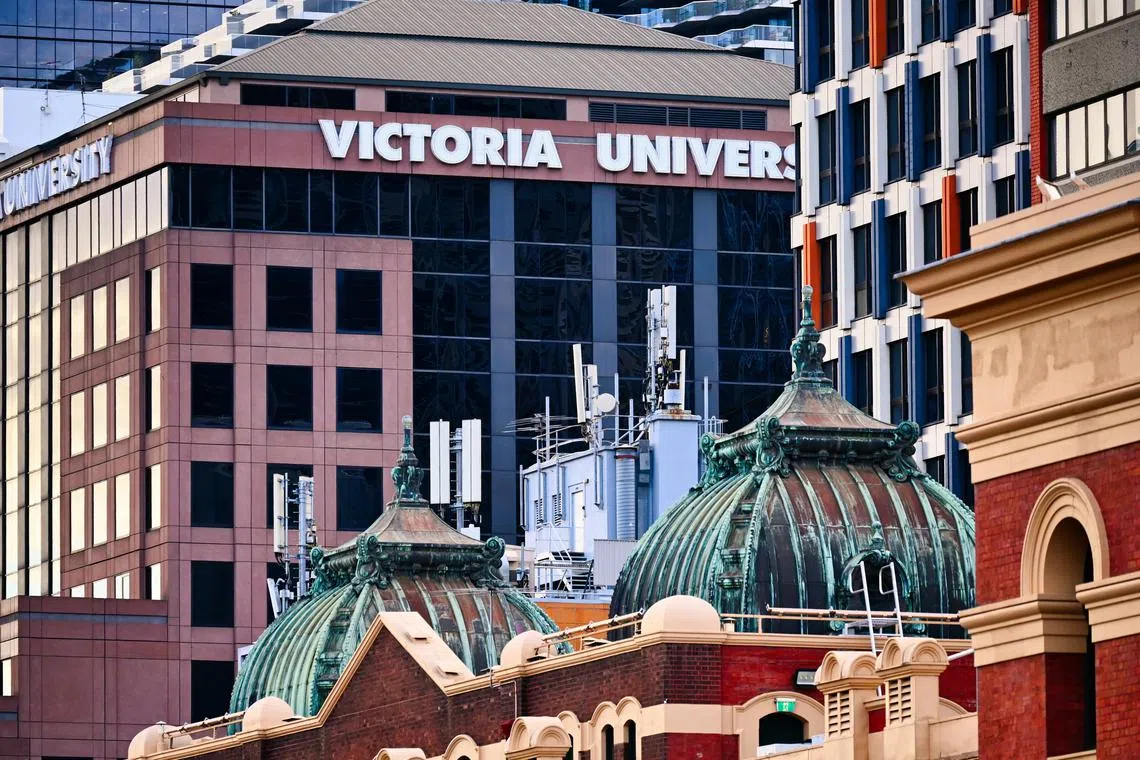Australia to review student visas as universities clamp down on fake applications from India
Sign up now: Get insights on Asia's fast-moving developments

Victoria University in March introduced extra requirements to verify applicants' information such as their study history and financial status.
PHOTO: UNSPLASH
Follow topic:
SYDNEY – Universities in Australia have imposed curbs on students from several Indian states over concerns that applicants are not genuinely interested in studying and are enrolling to obtain work visas.
The crackdown comes as the federal government revealed on Thursday that it plans to tighten the requirements for student visas due to concerns that applicants are entering for the wrong reasons.
International students have been pouring back into Australia since the easing of travel restrictions from late 2021, delivering a welcome boost to universities, which are heavily dependent on foreign fees.
In 2022, the education sector in Australia – including universities, schools and technical and English-language colleges – was worth A$29 billion (S$25.6 billion).
As at February, there were close to 550,000 international students studying at Australian institutions, including 125,632 from China, 89,766 from India and 48,078 from Nepal.
There were also 5,572 students from Singapore, up 6 per cent from the previous year.
But the federal government has become increasingly concerned that students from India and other countries in the region may be abusing the system.
Much of the concern has focused on states in northern India, particularly Punjab and Haryana.
An investigation by The Age newspaper earlier in April found that at least five Australian universities had introduced bans or restrictions on students from specific Indian states to prevent entry being granted to “non-genuine” students.
The newspaper reported that Edith Cowan University in Perth banned all applicants from Punjab and Haryana in February. Melbourne’s Victoria University in March introduced extra requirements to verify information such as their study history and financial status for applicants from eight states, including Uttar Pradesh, Rajasthan and Gujarat.
Torrens University, which has campuses in several cities, told The Times Higher Education in March that it was considering only “very strong” applications from Gujarat, Haryana and Punjab.
The increase in fraudulent applications reportedly followed a move by the federal government in January 2022 to allow international students to work an unlimited number of hours, from 20 hours a week, to address workforce shortages caused by the Covid-19 outbreak.
From July, a new limit of 24 hours a week will apply.
Following the lifting of the work cap in 2022, there was a sharp increase in student visa applications from India, Nepal and Pakistan.
The Department of Home Affairs expressed concern that this increase was matched by a rise in incomplete and fraudulent applications.
Home Affairs Minister Clare O’Neil announced on Thursday that the government plans to review the requirements used to grant student visas to “ensure that students are actually here to study”.
“Instead of pretending that some students are here to study when they are actually here to work, we need to look to create proper, capped, safe... pathways for workers in key sectors, such as care.”
The influx of students for work purposes has raised concerns that some may be exploited by employers or may face mental health problems due to pressure from family members back home who urge them to work as many as 100 hours a week.
An MP from the ruling Labor party, Mr Julian Hill, co-convener of the Government’s Council for International Education, said the access to uncapped work hours had been exploited by international education agents who facilitate visa applications.
“Agents in many parts of the world (are) flogging our precious student visa as some kind of cheap, low-rent work visa,” he told The Australian Financial Review.
Some cheaper vocational colleges in Australia have also reportedly been trying to poach students from universities, who can then continue to work uncapped hours but pay lower tuition fees.
The chief executive of the International Education Association of Australia, Mr Phil Honeywood, told a parliamentary inquiry into Australia’s international student sector that it had become a “Ponzi scheme”.
“Clearly, in a global community coming out of Covid, this was manna from heaven for a lot of families doing it tough in countries, particularly in our region,” he told the inquiry.
“Mum and dad’s family business in Punjab or in Kathmandu may have been suffering, and suddenly there’s this situation where a Western country, Australia, is offering Australian dollars for unlimited work rights.
“It’s become a bit of a Ponzi scheme which is attracting young people with the wrong motivation.”


